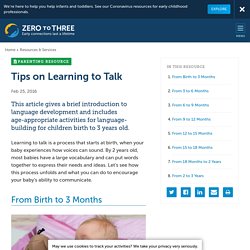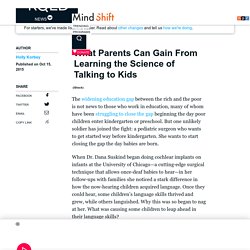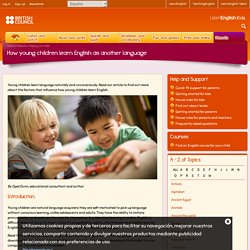

Look back at these statements from Week 1. Tips on Learning to Talk. Learning to talk is a process that starts at birth, when your baby experiences how voices can sound.

By 2 years old, most babies have a large vocabulary and can put words together to express their needs and ideas. Let’s see how this process unfolds and what you can do to encourage your baby’s ability to communicate. From Birth to 3 Months Your baby listens to your voice. He coos and gurgles and tries to make the same sounds you make. Sing to your baby. From 3 to 6 Months Your baby is learning how people talk to each other. Hold your baby close so he will look in your eyes.Talk to him and smile.When your baby babbles, imitate the sounds.If he tries to make the same sound you do, say the word again. From 6 to 9 Months Your baby will play with sounds. Play games like Peek-a-Boo or Pat-a-Cake. From 9 to 12 Months Your baby will begin to understand simple words.
From 12 to 15 Months Babies begin to use words. Talk about the things you use, like “cup,” “juice,” “doll.” A few more myths about speakers of multiple languages. Does multilingualism cause language delays and identity problems? The British Council's Nayr Ibrahim busts a few more myths about speakers of multiple languages. Myth: Multilingualism causes language delay Raising children bilingually is sometimes believed to cause language delay. This misconception is based on a separate underlying proficiency (SUP) hypothesis. This theory, now discredited, suggests that languages are stored in separate compartments or containers, which represent half the capacity of the monolingual brain.
Decades of research into bi- and multilingualism has shown that there is no causal relationship between bilingualism and language delay. Myth: Multilinguals should develop literacy in one language first When children are surrounded by multiple languages, they will inevitably have access to multiple literacies. Does being bilingual make you smarter?
Language teacher and researcher Miguel Angel Muñoz explains the latest research on how being bilingual affects your brain, ahead of a British Council seminar in Cardiff on whether learning a foreign language makes you smarter. You can watch the live-streamed seminar on Tuesday, 3 June. More than half the world's population uses two or more languages every day It is hard to estimate the exact number of bilingual people in the world, as there is a lack of reliable statistics . But in 2012, a Eurobarometer survey established that 'just over half of Europeans (54%)' are bilingual, and other studies hypothesise that more than half of the world’s population is bilingual.
So what about you? How can young children best learn languages? The British Council's Tracey Chapelton explains how parents of young children can lay the foundations for success. Children's brains are highly active Your child is unique, but what all children have in common is natural curiosity and an innate ability to learn. Kuhl states that babies and young children are geniuses at acquiring a second language. 'Babies', she says, 'can discriminate all the sounds of all languages... and that's remarkable because you and I can't do that.
We're culture-bound listeners. Development Matters FINAL PRINT AMENDED. Further Reading. KQED Public Media for Northern CA. There was a direct correlation between the children who’d heard a lot of parent talk and how prepared they were to learn once they arrived at school.

Hart and Risley wrote, “With few exceptions, the more parents talked to their children, the faster the children’s vocabularies [grew] and the higher the children’s IQ test scores at age 3 and later.” For Suskind, a lightbulb went on. “The truth is, much of what you see in children born into poverty is analogous to children born deaf,” Suskind said. “It’s a really important point. The most fundamental science shows that it’s really language, and all that comes with it, the brain-building aspect of things, that makes a difference.”
Bringing Parents On Board In Suskind’s new book, "Thirty Million Words," she explains the research behind the word gap in detail, along with her research-based initiative of the same name, aimed at boosting children’s brains in the first three years of their lives. . * Tune In. . * Talk More. Patricia Kuhl: The linguistic genius of babies. Alison Gopnik: What do babies think? How young children learn English as another language. By Opal Dunn, educational consultant and author Introduction Young children are natural language acquirers; they are self-motivated to pick up language without conscious learning, unlike adolescents and adults.

They have the ability to imitate pronunciation and work out the rules for themselves. Any idea that learning to talk in English is difficult does not occur to them unless it’s suggested by adults, who themselves probably learned English academically at a later age through grammar-based text books. Read the notes below about young children learning English as another language. The advantages of beginning early.
Language development.